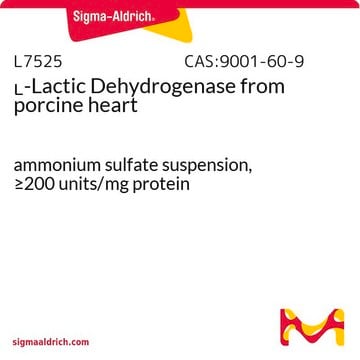N6005
β-Nicotinamide adenine dinucleotide, reduced disodium salt hydrate
≥94% (HPLC)
Synonym(s):
β-DPNH, β-NADH, DPNH, Diphosphopyridine nucleotide, reduced form, NADH
About This Item
Recommended Products
biological source
yeast
Quality Level
Assay
≥94% (HPLC)
≥94% (spectrophotometric assay)
form
powder
solubility
10 mM NaOH: soluble-100 mg/mL, clear to slightly hazy, slightly yellow to deep greenish-yellow
shipped in
wet ice
storage temp.
−20°C
SMILES string
O.[Na+].[Na+].NC(=O)C1=CN(C=CC1)[C@@H]2O[C@H](COP([O-])(=O)OP([O-])(=O)OC[C@H]3O[C@H]([C@H](O)[C@@H]3O)n4cnc5c(N)ncnc45)[C@@H](O)[C@H]2O
InChI
1S/C21H29N7O14P2.2Na.H2O/c22-17-12-19(25-7-24-17)28(8-26-12)21-16(32)14(30)11(41-21)6-39-44(36,37)42-43(34,35)38-5-10-13(29)15(31)20(40-10)27-3-1-2-9(4-27)18(23)33;;;/h1,3-4,7-8,10-11,13-16,20-21,29-32H,2,5-6H2,(H2,23,33)(H,34,35)(H,36,37)(H2,22,24,25);;;1H2/q;2*+1;/p-2/t10-,11-,13-,14-,15-,16-,20-,21-;;;/m1.../s1
InChI key
FWBNCIFELNNJCX-UHOVGGJYSA-L
Looking for similar products? Visit Product Comparison Guide
Application
Biochem/physiol Actions
As a reagent, NADH can be used in enzyme cycling assays to amplify detection of activity of biologically relevant enzymes or metabolites present in low concentrations.
Packaging
Storage Class Code
11 - Combustible Solids
WGK
WGK 3
Flash Point(F)
Not applicable
Flash Point(C)
Not applicable
Certificates of Analysis (COA)
Search for Certificates of Analysis (COA) by entering the products Lot/Batch Number. Lot and Batch Numbers can be found on a product’s label following the words ‘Lot’ or ‘Batch’.
Already Own This Product?
Find documentation for the products that you have recently purchased in the Document Library.
Customers Also Viewed
Our team of scientists has experience in all areas of research including Life Science, Material Science, Chemical Synthesis, Chromatography, Analytical and many others.
Contact Technical Service









